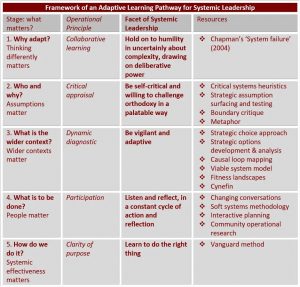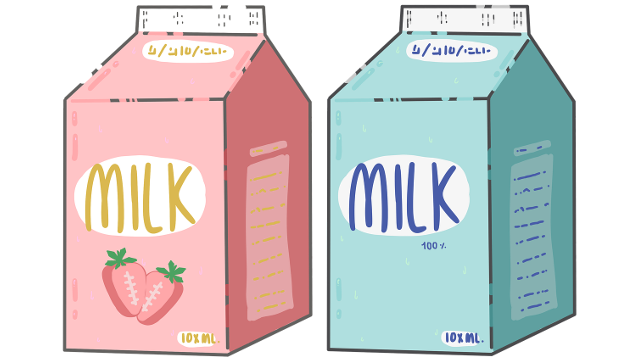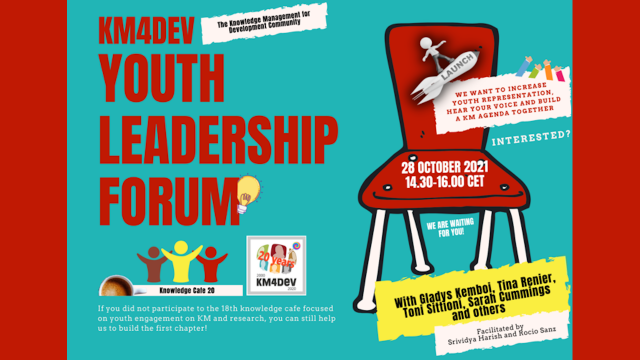
Adaptive social learning for systemic leadership
By Catherine Hobbs. Originally published on the Integration and Implementation Insights blog.
What’s involved in developing human capacity to address complexity, taking a mid- to longer-term viewpoint than is usual? How can we create the conditions in which people can cope with the daily challenges of living in a complex world and flourish? What form of leadership is required to inspire and catalyse this transformation?
Framework for adaptive social learning
The need for systems thinking is often referred to, but rarely considered, as a rich and comprehensive resource which could be developed further and applied. A critical systems thinking approach suggests that a variety of approaches should be drawn upon, in a manner of methodological pluralism, being aware of the strengths and weaknesses of different approaches and applying them adaptively using synthesis as well as analysis.
In the spirit of such an approach, I’ve developed a learning pathway for systemic leadership, with five stages to explore. Each stage has an operational principle, with signposting to resources drawn from systems thinking, complexity science and operational research.
It’s a heuristic framework that signposts established resources which, taken together, could help leaders adapt, in small and varied steps, to a new paradigm of social learning for systemic leadership. Although my research was at the local government level, the framework could be more broadly useful to others.
The figure below shows the framework of the five stages of the learning pathway, linking each stage with the key question to be asked (going back to the basics of ‘what matters?’), the operational principle, the facet of systemic leadership required and signposting to suggested resources to help. For more detail and references, see Hobbs (2019).

This framework:
- signposts resources to explore for each stage, helping to organise thinking about complexity and seeks to incorporate critical reflection about knowledge and values
- suggests an appropriate sequence of questions. Thus, it tries to avoid asking:
- how before being clear about what
- what before being clearer about the wider context
- thinking about the wider context before thinking about who is involved and why
- thinking about who is involved and why before thinking about why adaptation to change is needed.
The framework thus raises cautions against defaulting to only trying to ‘solve problems’ without questioning existing structures, as these may also need to adapt.
“The strongest bit is that it helps people to ask questions, the generic five questions are really good, that’s the key to it all… It’s exploring how asking questions takes people towards a systems thinking approach.” (statement from a local government representative; see Hobbs 2019: 151)
Dunn’s social learning metaphor
The sequence of five questions thus helps to catalyse facets of social learning which are compatible with systemic leadership. This is strongly linked to the way Dunn (1971) envisaged ways of escaping deterministic models of economics and the social sciences through significant ‘portals’ (including systems theory) to a social learning metaphor that is open and creative rather than programmed, as an emerging social science paradigm which could more successfully approach critical developmental social problems.
Dunn presented this idea as the ‘fourth human threshold’ (Dunn 1971: 262) of human-social evolution, following symbolisation (speech and communication), social maintenance (social systems and groups) and the classical scientific method, which has fed the industrial and technological revolution.
Dunn foresaw that this would create anomalies as slow-moving social sciences would be unable to keep pace with the fast-paced physical sciences, and that such social learning would then be an ideal way of commitment to both science and human values. This concept of social learning, incorporating both science and human values, could represent the beginning of a journey to develop skills for systemic leadership in complexity.
Systemic leadership as design for adaptive social learning
The approach presented here extends many previous conceptions of leadership, being characterised by:
- maintaining a sense of puzzlement and curiosity
- acceptance of uncertainty
- acknowledgement of the creativity of dissent
- the questioning of boundaries imposed by human endeavour and working across them both within and beyond the organisation
- finding our way responsibly
- acknowledging the need for a high-variety approach of thinking and action to address complexity.
In this context, systemic leadership could fruitfully be interpreted as design for adaptive social learning.
Concluding questions
What do you think of the ideas presented? Do you have other ideas for creating a space for adaptive social learning? Do you have experience to share of embedding adaptive social learning into organisational routine? What suggestions do you have for designing for systemic leadership in complexity?
Find out more:
Hobbs, C. (2019). Systemic Leadership for Local Governance: Tapping the Resource Within. Palgrave Macmillan: Cham, Switzerland. (Online – book details): https://www.palgrave.com/la/book/9783030082796
References:
Chapman, J. (2004). System Failure: Why Governments Must Learn to Think Differently. 2nd edn. Demos: London, United Kingdom. (Online): https://www.demos.co.uk/files/systemfailure2.pdf (PDF 466KB).
Dunn, E. S. (1971). Economic and Social Development: A Process of Social Learning. The John Hopkins Press: Baltimore, United States of America.
Biography
 |
Catherine Hobbs PhD is an independent researcher located in North Cumbria, UK. She is a social scientist with experience of working in academia and local government, with practical experience of developing multi-agency strategies in transport and health. She is interested in developing better links between the practice of local governance and scholarly expertise in order to increase capacity to address issues of complexity through knowledge synthesis. She is also interested in the potential of applying and developing a variety of systems thinking approaches (in the tradition of critical systems thinking), with the innovation and design movements in public policy. |
Article source: Adaptive social learning for systemic leadership. Republished by permission.
Header image source: Creativity103, CC BY 3.0.






